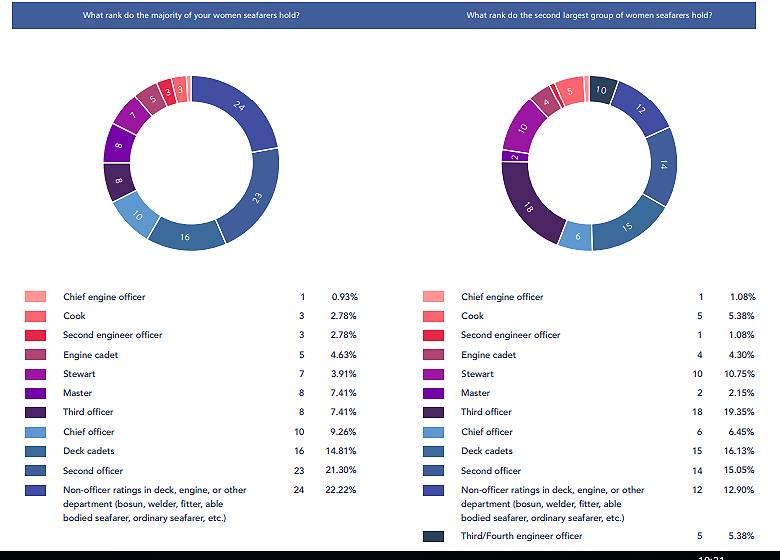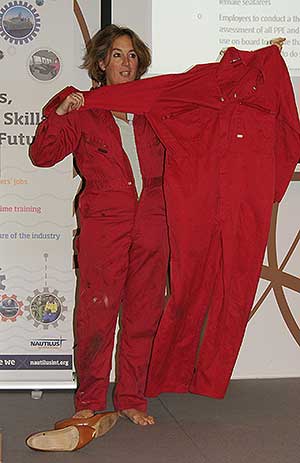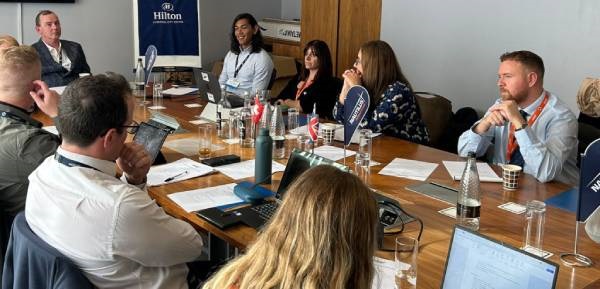
Despite some reported progress for women in maritime, a new study shows how important it is for female seafarers to join a union that can stand up for their rights, argues Deborah McPherson
The latest IMO/WISTA Women in Maritime Survey has identified a widening gender gap in the maritime industry, despite some bright spots in green and digital sectors – findings which have raised concerns at Nautilus International.
Based on 2024 data, the survey report reveals that women now make up just 19% of the total global maritime workforce – down from 26% in 2021. At sea, the numbers are even starker: women represent only 1% of the active global seafaring workforce, according to data from surveyed organisations that directly hire seafarers internationally. In the UK, female seafarer representation has also dropped from 7% to 4% since 2021.
While women are gaining ground in emerging areas like environmental, social and governance (ESG) policy-making, decarbonisation, and maritime tech, traditional sectors such as legal services and bunkering are seeing a decline in female participation.
The survey – which makes up the second such report on the participation of women in the public and private maritime sector workforces – gathered data both from IMO member states and private sector entities. Out of 176 IMO member states, 94 participated in the survey, with 88 submitting complete data sets. On the industry side, 608 private sector organisations from 37 maritime sub-sectors took part, including companies, NGOs, educational institutions, and maritime training academies. Each group received a distinct questionnaire tailored to their respective workforces. As such, responses from each group were treated as separate and non-overlapping for the purposes of analysis.

The report says there is 'a clear need for sustained efforts to improve gender diversity in maritime'.
Nautilus women's lead Rachel Lynch said the report highlighted the very barriers Nautilus had been tackling on behalf of women at sea on for many years such as safer, more flexible workplaces, inclusive leadership pathways, mentorship and return-to-work support, and gender-neutral language in collective bargaining agreements
With a traditionally higher percentage of female seafarers members than the global average across its UK, Dutch and Swiss branches, Nautilus offers a ready-made network of protection, and support, added Ms Lynch.
'We can help you deal with workplace issues and bargain where there are collective bargaining agreements – and we provide forums for members to raise career barrier issues that can be taken to our governing Council and campaigned on globally and nationally.
'Collective action is central to achieving gender equality in maritime and joining a professional maritime union like Nautilus is the most effective vessel for driving industry change.'

Nautilus: driving change and tracking progress
Nautilus International continues to turn conference motions into momentum, with tangible progress on key diversity issues raised by members at General Meetings and Branch Conferences. From ill-fitting PPE to workplace harassment and work-life balance, the Union is making sure members' voices are heard at every level.
Nautilus is a member-led organisation, so members attending the Union's General Meeting (GM) vote to set the policy, strategy and direction for the Union over the four year period between general meetings. The GM in 2023 adopted various motions on members' behalf surrounding the need to create a more diverse and inclusive industry.
Once a motion is adopted, the Union's senior leadership team ensure that progress is made on members' aspirations with subsequent reports to council and members – including an interim mid-term report – which track the resolutions at each council meeting until the next GM.
But it doesn’t stop there. Nautilus also uses its seat at the table in global forums – including the International Maritime Organization (IMO), International Labour Organization (ILO), and the UK Trades Union Congress (TUC) – to push for industry-wide improvements benefiting all seafarers. Here are some examples of what the Union has achieved:
Introducing appropriately-sized protective clothing
The Maritime Labour Convention (MLC), and the 2022 amendments now require 'appropriately sized' personal protective equipment – directly addressing concerns raised by members about ill-fitting gear.
Tackling harassment at sea
The Union has regular input into the MLC amendments where latest amendments include new protections against bullying and harassment (pending ratification), which will be a major step forward for safer, more respectful workplaces.
Supporting work-life balance
The 2025 TUC Women's Conference motion – presented by Nautilus and unanimously passed –championed maternity rights, return-to-work support, and flexible working arrangements.
Zero-tolerance policies
Nautilus continues to advocate for zero-tolerance policies on harassment and discrimination across the maritime sector.
Inclusive language
Work is underway to ensure all collective bargaining agreements use gender-neutral and inclusive language.
Image: Nautilus Council member Jessica Tyson makes the point about ill-fitting PPE at a previous Union meeting. Image: Nautilus International

How your Union amplifies your voice
Collective strength. Real results.
When you join Nautilus, you’re not just signing up – you're speaking up.
Your motions shape our campaigns
Your input guides our bargaining
Your voice is heard – locally and globally
Together, we’re building a fairer, safer, more inclusive maritime industry.
Join us. Be part of the change.
Image: Members taking part in the democratic life of a union at General Meetings ensure collective progress towards breaking down barriers at sea. Nautilus International.
Tags
More articles
Sanitary win welcomed for female seafarers under MLC
Years of campaigning for sanitary products by Nautilus, its female members and other maritime organisations have resulted in a win for women onboard.
